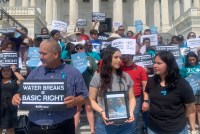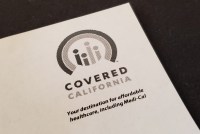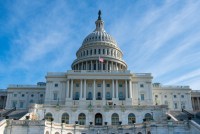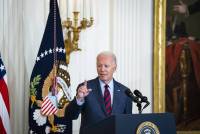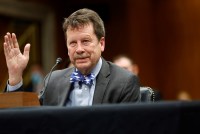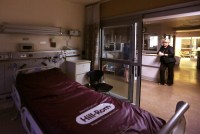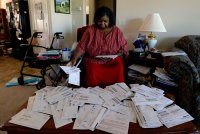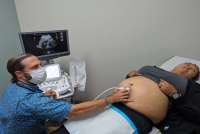Latest Morning Briefing Stories
Texan Activists Thirst for a National Heat Standard to Protect Outdoor Workers
As much of the U.S. faces extremely high summer temperatures, Texas’ Republican governor, Greg Abbott, has taken steps that effectively eliminate mandated water breaks for construction workers. In response, protesters from the Lone Star State came to Washington, D.C., to press for federal protections for such outdoor workers.
Bankrupt California Hospital Receives Lifeline From Adventist, Report Says
The Fresno Bee reports that Madera Community Hospital has reached an agreement with Adventist Health to take over the bankrupt facility and avoid liquidation.
What the Health? From KFF Health News: Another Try for Mental Health ‘Parity’
President Joe Biden is kicking off his reelection campaign in part by trying to finish a decades-long effort to establish parity in insurance benefits between mental and physical health. Meanwhile, House Republicans are working to add abortion and other contentious amendments to must-pass spending bills. Joanne Kenen of the Johns Hopkins Bloomberg School of Public Health and Politico, Anna Edney of Bloomberg, and Sarah Karlin-Smith of the Pink Sheet join KFF Health News’ chief Washington correspondent, Julie Rovner, to discuss these issues and more. Also this week, Rovner interviews KFF Health News’ Céline Gounder about her podcast “Epidemic.” The new season focuses on the successful public health effort to eradicate smallpox.
Home Sweet Parking Lot: Some Hospitals Welcome RV Living for Patients, Families, and Workers
Medical and RV industry professionals say hospitals that offer RV parking are easing access to health care for some patients who drive long distances for treatment, like many rural residents.
Covered California to Cut Patient Costs After Democratic Lawmakers Win Funding From Gov. Newsom
California’s health insurance exchange will reduce how much some patients pay for care next year, including hospital deductibles, appointment copays, and prescription drugs. Lawmakers pressed Gov. Gavin Newsom to make good on a four-year-old pledge to use proceeds from a tax penalty on uninsured people to help people pay for treatment.
Pain Clinic Chain to Pay $11.4M to Settle Medicare and Medicaid Fraud Claims
The owner of one of California’s largest chains of pain management clinics has agreed to pay California, Oregon, and the federal government to settle Medicare and Medi-Cal fraud allegations.
A Year With 988: What Worked? What Challenges Lie Ahead?
The 988 Suicide & Crisis Lifeline, a national hotline, reached its first-year milestone this month.
New Weight Loss Drugs Carry High Price Tags and Lots of Questions for Seniors
Although nearly 40% of Americans 60 and older are obese, Medicare doesn’t cover weight loss medications. Meanwhile, studies haven’t thoroughly examined new drugs’ impact on older adults.
Hospitals Ask Congress to Delay ACA Medicaid Funding Cuts — For the 14th Time
Congress has until October to avert cuts to a Medicaid program intended to support safety-net hospitals that, in practice, improves the bottom lines of other hospitals, too. Hospital leaders say now is not a good time for the cuts — which lawmakers have so far postponed 13 times.
Everything Old Is New Again? The Latest Round of Health Policy Proposals Reprises Existing Ideas
House Republican legislation promises more health insurance options but fewer protections, even as the Biden administration seeks to rein in short-term plans, which were expanded in the Trump era.
FDA Head Robert Califf Battles Misinformation — Sometimes With Fuzzy Facts
FDA Commissioner Robert Califf has called misinformation one of the deadliest killers in the United States. As the FDA tries to fight that scourge, it sometimes stumbles.
Giant Health System Almost Saved a Community Hospital. Now, It Wants to ‘Extract Every Dollar.’
A bankruptcy judge will soon decide whether a Central Valley hospital needs to liquidate to repay its creditors. Its largest creditor, St. Agnes Medical Center, is the very entity that backed out of purchasing the Madera Community Hospital last December.
Medical Debt Is Making Americans Angry. Doctors and Hospitals Ignore This at Their Peril.
Doctors and hospitals hold an exalted position in American life, retaining public confidence even as other institutions such as government, law enforcement, and the media are losing people’s trust. But with health care debt out of hand, medical providers risk their good standing.
Doctors Created a Primary Care Clinic as Their Former Hospital Struggled
With the community’s help, former co-workers came together to fill gaps in care left by the loss of doctors and departments at a Gallup, New Mexico, hospital.
Industry Groups in California Vie for New Medicaid Money
State officials have promised to boost funding for California’s Medicaid program by $11.1 billion starting next year, with most of that money earmarked for higher payments to doctors, hospitals, and other providers. But the details have yet to be worked out, and powerful health industry groups are jockeying for position.
What the Health? From KFF Health News: Let’s Talk About the Weather
It’s been the summer of broken weather records around the world — for heat, rain, and wildfire smoke — advertising the risks of climate change in a big way. But, apparently, it’s not enough to break the logjam in Washington over how to address the growing climate crisis. Meanwhile, in Texas, women who were unable to get care for pregnancy complications took their stories to court, and Congress gears up to — maybe — do something about prescription drug prices. Alice Miranda Ollstein of Politico, Shefali Luthra of The 19th, and Rachel Cohrs of Stat join Julie Rovner, KFF Health News’ chief Washington correspondent, to discuss these issues and more. Also this week, Rovner interviews Meena Seshamani, the top administrator for the federal Medicare program.
A Mom Owed Nearly $102,000 for Hospital Care. Her State Attorney General Said to Pay Up.
As politicians bash privately run hospitals for their aggressive debt collection tactics, consumer advocates say one North Carolina family’s six-figure medical bill is an example of how state attorneys general and state-operated hospitals also can harm patients financially.
Congress Considers Easing Regulations on Air Transport of Donated Organs
A little-noticed provision of sweeping legislation to reauthorize the Federal Aviation Administration would make it easier to fly human organs from donor to recipient.
The Painful Legacy of ‘Law and Order’ Treatment of Addiction in Jail
Efforts to improve addiction care in jails and prisons are underway across the country. But a rural Alabama county with one of the nation’s highest overdose rates shows how change is slow, while law enforcement officials continue to treat addiction as a crime rather than a medical condition.
Once the New Over-the-Counter Birth Control Pill Is Available, What About Cost and Coverage?
The Food and Drug Administration’s approval is viewed as groundbreaking, but many details still must be figured out.



